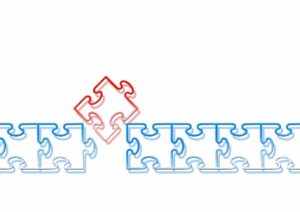
A sentence fragment is an incomplete sentence. Here are some examples:
- Before we went to the mall.
- Because it was raining.
- Eating lunch with my friend.
All of the above examples are missing words/ideas that are needed to make the sentences complete. Here are the same sentence fragments changed into complete sentences:
- Before we went to the mall, we ate lunch. (independent clause added)
- Because it was raining, we stayed inside. (Independent clause added)
- I enjoy eating lunch with my friend. (subject + verb added)
Quick Review: A Complete Sentence
All complete sentences have an independent clause, which contains a subject and a verb:
- We danced.
- He is at home.
- The glass broke.
- I love you.
These are called independent clauses because they are complete thoughts. In other words, when we read them, we understand them completely and do not feel like information is missing.
Common Fragment Mistakes: Dependent Clauses
Although an independent clause represents a complete thought, a dependent clause represents an incomplete thought. In other words, more information is needed to understand it. These examples are fragments because they are incomplete:
- If I had more money. (Then what?)
- Which is why I was angry. (What does 'which' refer to?)
- Although tax increased. (What happened although it increased?)
To make these dependent clauses into full sentences, you need to add an independent clause. (Note: When a sentence has a dependent clause and an independent clause, it is called a complex sentence):
- If I had more money, I would buy a house.
- I failed my exam, which is why I was angry.
- Although tax increased, people continued to shop.
Note: Dependent clauses are also known as subordinate clauses, and they begin with a subordinate conjunction. Recognizing which words begin dependent clauses (i.e. which words are subordinate conjunctions) is important for understanding how to make complete sentences. Here are some common subordinate conjunctions:
| Time | Contrast | Cause & Effect |
|
|
|
| Conditions | Relative Pronouns | |
|
|
Common Fragment Mistakes: Prepositional Phrases
Prepositions are words like in/at/on/under that come before a noun. Here are some examples of prepositional phrases that are fragments:
- In the morning
- At the table near the entrance
- On the topic of health issues
None of these phrases have a subject and a main verb, so they are not complete thoughts. To make them complete, you need to add an independent clause:
- In the morning, I brush my teeth.
- At the table near the entrance, several customers were arguing.
- On the topic of health issues, experts disagree on the effects of coffee.
Common Fragment Mistakes: Sentences without a Subject or Verb
These examples are fragments because they do not have either a subject or a verb:
- Is a good idea. (What is? A subject is missing.)
- Has been a great experience. (What is? A subject is missing.)
- The incredible pyramids in Egypt. (What about them? Add a verb.)
- Starting your own business. (What about it? Add a verb.)
Sentences missing subjects can be a common English error of speakers of Spanish and Portuguese. To make these ideas into a complete sentence, add a subject or a verb:
- Resting is a good idea.
- This has been a great experience.
- The incredible pyramids in Egypt are quite large.
- Starting your own business requires a lot of money.
Do you think you understand? Try these exercises to see if you can distinguish sentence fragments from complete sentences.
Exercises: Are these sentences fragments?
1. When people learn the value of working with people from other cultures.
Show Answer
Fragment-- This is a subordinate clause. An independent clause is needed. E.g. "When people learn the value of working with people from other cultures, workplace difficulties will decrease."
2. Unless she pays, she cannot attend the event.
Show Answer
Complete sentence (Dependent clause + Independent Clause)
3. Running on the street at night by yourself.
Show Answer
Fragment-- Here "Running on the street at night by yourself" is a subject. The sentence is missing a verb, e.g. "Running on the street at night by yourself is a bad idea."
4. With no one to help him, John felt lost.
Show Answer
Complete sentence (Independent Clause)
5. Whereas the Earth's population is increasing.
Show Answer
Fragment-- This is a subordinate clause. An independent clause is needed. E.g. "The amount of available land is decreasing whereas the Earth's population is increasing."
6. Because my instructor told me it was important.
Show Answer
Fragment-- This is a subordinate clause. An independent clause is needed. E.g. "Because my instructor told me it was important, I studied it."
7. Forty-five questions in the survey.
Show Answer
Fragment-- This sentence is missing a verb. To correct it, add a verb. E.g. "There are forty-five questions in the survey."
That's the end of the lesson on fragments. If you have a question or find a mistake, please leave a comment below.
- Matthew Barton (copyright) / Creator of Englishcurrent.com
Related Pages

I like this article.
Great. Glad to see that you are enjoying the site’s content.